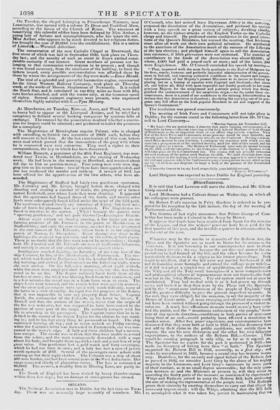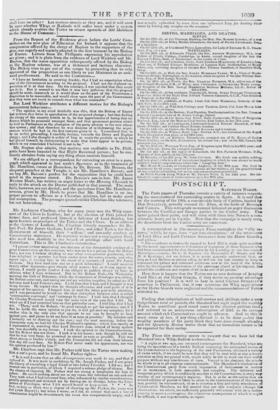Whatever may be the merits or demerits of the Reform
Act, the Timer and the ‘`Spcetater are as much to blame for its success as the liiiisters. It is not becomitig in our contemporaries now to abuse their former friends ; the one because the act does not unswer the ex- pectinous he had formed of the bill, and the other because he seems !sancta:10y desitous to fix a stigma on his former proceedings. Both ought to recallect, that if the bill were not carried further—if it did not disfranchise inure boroughs and extend the stiffiage more widely—. if it did list adopt a simpler test of qualification, and disfranchise all the Whig nod all the Tory small boroughs—if a more comprehensive and philosophical scheme of representation were not framed—the fault was nut in the Whig Ministers. The old system could not at once be annihilated. They had to deal with it as it had grown up through ages; and backed as they then were by the Times and the Spectator, and by that " unanimous enthusiaon of the people of England," they had the greatest difficulty to pass the present imperfect measure. In the end, they were obliged, for the occasion, to set the majority of the House of Lords aside. A more sweeping and effectual measure could not have been carried without going through the process of a violent re. volution. A much less efficacious measure would scarcely have satis- fied the publics and the " uhuanimous etahusiasm of the people," desti- tute of' arty specific direction—confidence in both parties of statesmen being then at an end—would probably have effected a revolution in another sense. After five years' experience, our contemporaries have discovered that they were both at fault in 1831; but that discovery does not add to their cluim to the public confidence, nor entitle them to impute, the one his own dishonesty and the other his own fallacious expectations, to the authors of the Reform Bill.—Courier. IThis would-be eunniog paragraph is only silly, so far as it regards us. The Spectator has no 'egrets for the putt it performed in 1831—has made no discovery of having been then "at fault." The Spectator supported the Reforin Bill in 1831, avowedly, as a first step ; and seeks its atnendment in 1837, because a second step has become neces- sary. Doubtless, for the so-early and signal failure of the Reform Act as passed in 1832, we consider Lord Grey by the abuse of his mighty majority in the Commons, and Lord Grey's successors by sonic parts of their conduct, as in no small degree answerable; but the only ques- tion between us and the Ministers at present is, will they assist in amending the faulty parts of the measure, as manifested by experience? Whigs and Radicals joined to carry the Reform Bill, both profes.strig the aim of making the representation of the people real. The Radicals prove their sincerity by exerting themselves to carry out that object hy necessary improvement : will the Whigs, admitting that the Bill fails to accomplish what it was taken for, persist in maintaining. that ‘s* shall have no other? Let matters remain as they are, and it will soon be seen whether Whigs or Radicals will suffer most under a system which already enables the Tories to return upwards of 300 Members to the House of Common4.1



























 Previous page
Previous page